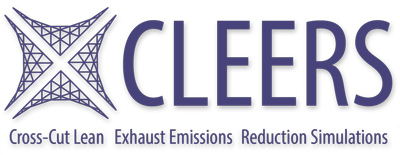Cobalt as an Efficient Promoter in Low-loading Pd/BEA Catalysts for CH4 Oxidation
Junjie Chen, University at Buffalo
Cobalt as an Efficient Promoter in Low-loading Pd/BEA Catalysts for CH4 Oxidation
Junjie Chen, Jungkuk Lee, Eleni A. Kyriakidou*
Department of Chemical and Biological Engineering, University at Buffalo, The State University of New York, Buffalo, NY 14260, USA
*elenikyr@buffalo.edu
Natural gas vehicles (NGVs) have shown the potential for decreased greenhouse gas emissions, but they are limited by the EPA requirements for reducing methane (CH4) emissions, the main component of natural gas. Palladium (Pd)-based zeolite catalysts have been quite successful at reducing CH4 emissions. The main drawback of these catalysts is the prohibitive cost of Pd. Decreasing the Pd loading to lower than 1-2 wt.% is of current interest but it can lead to an undesirable increase in the ionic Pd/PdO ratio [1], since ionic Pd is less active than PdO nanoclusters for the CH4 oxidation reaction. Thus, there is a critical need to design catalysts for NGVs aftertreatment applications containing a decreased amount of Pd while compressing the formation of ionic Pd.
Herein, we report a facile method that decreases Pd usage in 1 wt.% Pd/BEA while maintaining the CH4 oxidation performance. These results are achieved by introducing 0 – 1.5 wt.% cobalt (Co) in 0.5 wt.% Pd/BEA (Pd(0.5)/BEA) zeolites (Si/Al = 12.5). CH4 conversion of Pd(0.5)/BEA at 500℃ was as low as 12% (Fig. 1a), attributed to the majority of Pd being present in its ionic form. Co-impregnation of Co with Pd in BEA zeolites led to an enhanced CH4 oxidation performance. Specifically, an increase in Co loading from 0.1 to 1 wt.% led to a decrease in the CH4 oxidation T50 from 456 to 352℃. Pd(0.5)Co(1.0)/BEA showed the best performance with T50 and T90 equal to 352 and 419℃, respectively. Stability tests at 450℃ (Fig. 1b) showed that Pd(0.5)Co(1.0)/BEA had a similar CH4 conversion (~94%) and was more water resistant than Pd(1.0)/BEA. This work illustrates that Co incorporation in Pd/BEA zeolites can achieve the same CH4 oxidation performance results with 50% reduction of precious metal usage. 
Fig. 1. (a) CH4 conversion over Pd(0.5)Co(x)/BEA (x = 0, 0.1, 0.28, 0.5, 1.0, 1.5), 1 wt.% Co/BEA, and 1 wt.% Pd/BEA catalysts, (b) Long-term stability test for CH4 oxidation over Pd(0.5)Co(x)/BEA (x = 0, 1.0) and 1 wt.% Pd/BEA catalysts under dry and wet (5% H2O) conditions at 450℃. Reaction conditions: 1500ppm CH4, 5% O2, Ar balance, GHSV = 99,900 mLgcat-1h-1.
[1] K. Khivantsev, N.R. Jaegers, L. Kovarik, J.C. Hanson, F. Tao, Y. Tang, X. Zhang, I.Z. Koleva, H.A. Aleksandrov, G.N. Vayssilov, Angew. Chem., 57 (2018) 16672-16677.

